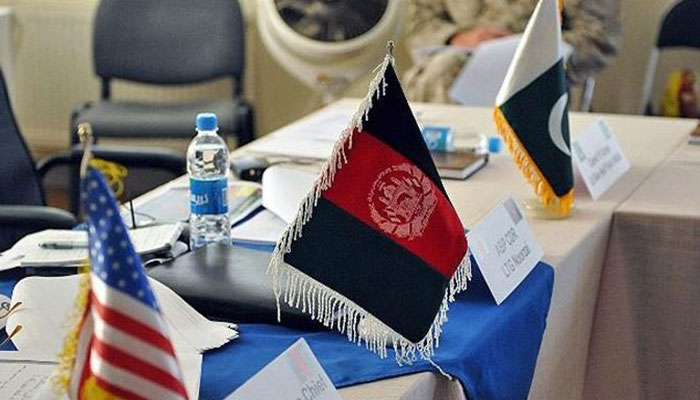Pak-Afghan ties climbing up the downward spiral?
August has been a positive month for Pakistan-Afghanistan ties
September 19, 2017

Though Pakistan’s relations with Afghanistan and the United States of America have gone from bad to worse, certain positive things have happened recently to raise hopes that the downward spiral in the relationship could be checked.
Two military-centred meetings in Kabul on September 14, with representation from Afghanistan, Pakistan and the US, were the latest in ongoing efforts to improve relations and increase cooperation in the war against terrorism.were the latest in ongoing efforts to improve relations and increase cooperation in the war against terrorism.military-centred meetings in Kabul on September 14, with representation from Afghanistan, Pakistan and the US, were the latest in ongoing efforts to improve relations and increase cooperation in the war against terrorism.
A six-member military delegation from Pakistan headed by Major General Sahir Shamshad, the director general of military operations, visited Kabul to attend the two meetings. One was a meeting of the Pak-Afghan bilateral military cooperation and the other the Tripartite Pak-Afghan-US to counter Daesh, a notorious militant group were the latest in ongoing efforts to improve relations and increase cooperation in the war against terrorism.were the latest in ongoing efforts to improve relations and increase cooperation in the war against terrorism.
According to the Inter-Services Public Relations (ISPR), the Afghan, Pakistan and US representatives reaffirmed their resolve to continue the fight against the common threat of terrorism and to eliminate Daesh from the region through information sharing, complementary efforts and enhanced cooperation.
The ISPR said that during their bilateral meeting, military commanders from Afghanistan and Pakistan discussed cross-border attacks, counter-terrorism and coordinated actions, and the detainees’ exchanges. Concluding, they agreed to make progress in line with the commitments made at recent high-level meetings. They decided to formulate an action plan that would contribute towards improving security through enhanced cooperation along the nearly 2,500-kilometres-long, largely porous Pak-Afghan border.along the nearly 2,500-kilometres-long, largely porous Pak-Afghan border.
The “high-level meetings” that the statement was referring to was last month’s visit of an Afghan military delegation to Pakistan and the Quadrilateral Counter Terrorism Coordination Mechanism meeting held the same month in Tajikistan’s capital, Dushanbe. Spearheaded by China, the quadrilateral group brought together top military leaders from Afghanistan, Pakistan and Tajikistan, along with their Chinese counterpart, to adopt an inclusive and cooperative regional approach to combat terrorism. The occasion also provided an opportunity to Pakistan Army chief General Qamar Javed Bajwa to meet the Afghan Chief of General Staff General Sharif Yaftali on the sidelines of the conference. Both men agreed on the need to form a Pak-Afghan working group to jointly work and formulate security recommendations that address mutual concerns. General Bajwa made the proposal and its acceptance by the Afghan National Army led to the exchange of visits by military delegations.
There have been other hopeful signs of progress as a result of the increased interaction between the two sides. In August, Pakistan’s Foreign Secretary, Tehmina Janjua, paid a visit to Kabul and met all top Afghan government functionaries, including President Ashraf Ghani and Chief Executive Officer Dr Abdullah Abdullah. Then the Afghan deputy foreign minister, Nasir Andesha, came to Pakistan to attend Afghanistan’s Independence Day event in Islamabad and meet Pakistani officials.
The forthcoming meeting of the Pak-Afghan Joint Economic Commission is a major event as it has been convened after 22 long months. Any progress made at the meeting of the commission being held in Kabul could help improve trade ties that have suffered setbacks due to the deteriorating relations between the two countries. The frequent closure of the border due to security concerns, the drawdown of the NATO forces from Afghanistan and Kabul’s efforts to develop alternate transit trade route for reducing dependence on Pakistan have caused a drop in their mutual trade from $2.4 billion in 2010-11 to $1.43 billion in 2015-16.
All these positive developments were followed by President Ghani’s offer of talks with Pakistan to resolve all outstanding issues. He noted that making peace with Pakistan was part of his unity government’s national agenda.
As Pakistan has repeatedly expressed its readiness to hold talks with Afghanistan and play its role in making the war-ravaged country peaceful and stable, it is time for Kabul and Islamabad to take the necessary steps to improve their relations and jointly fight terrorism. It cannot be easy, considering the failed attempts in the past to overcome distrust and befriend each other. Still, improved relations between Afghanistan and Pakistan is the best guarantee to peacefully end the long drawn out Afghan conflict through political settlement involving Kabul and the Afghan Taliban.
Yusufzai is the Resident Editor of The News International in Peshawar
Views of the author do not necessarily reflect the views or editorial policy of Geo News











